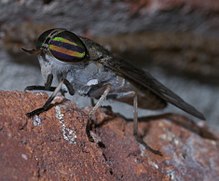Tabanus is a genus of biting horseflies of the family Tabanidae. Females have scissor-like mouthparts that are able to penetrate the skin of livestock animals. The horsefly can then extract and ingest the animal's blood. Horseflies of this genus are known to be potential vectors of anthrax, worms and trypanosomes. Some species, such as Tabanus bovinus, prefer bovine animals and are less harmful to humans. The genus contains hundreds of species and many species groups.[1][2][3]
| Tabanus | |
|---|---|

| |
| Tabanus sudeticus | |
| Scientific classification | |
| Domain: | Eukaryota |
| Kingdom: | Animalia |
| Phylum: | Arthropoda |
| Class: | Insecta |
| Order: | Diptera |
| Family: | Tabanidae |
| Subfamily: | Tabaninae |
| Tribe: | Tabanini |
| Genus: | Tabanus Linnaeus, 1758 |


See also
editReferences
edit- ^ Fairchild, G.B. (March 1980). "Tabanidae (Diptera) from the Dominican Republic". Florida Entomologist. 63 (1). The Florida Entomologist, Vol. 63, No. 1: 166–188. doi:10.2307/3494671. JSTOR 3494671.
- ^ Stubbs, A. & Drake, M. (2001). British Soldierflies and Their Allies: A Field Guide to the Larger British Brachycera. British Entomological & Natural History Society. p. 512 pp. ISBN 1-899935-04-5.
- ^ Chvála, Milan; Lyneborg, Leif; Moucha, Josef (1972). The Horse Flies of Europe (Diptera, Tabanidae). Copenhagen: Entomological Society of Copenhagen. pp. 598pp, 164figs. ISBN 978-09-00-84857-5.